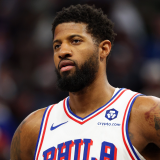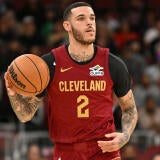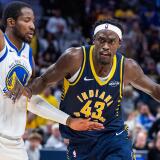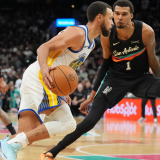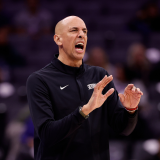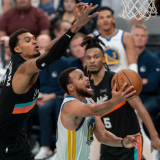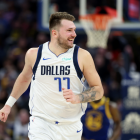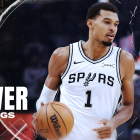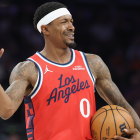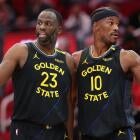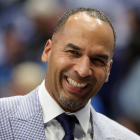
Tearing down the Mavericks: Finding a trade for every player who can legally move (except Cooper Flagg)
The Mavericks should rebuild around Flagg, but everyone else is trade bait
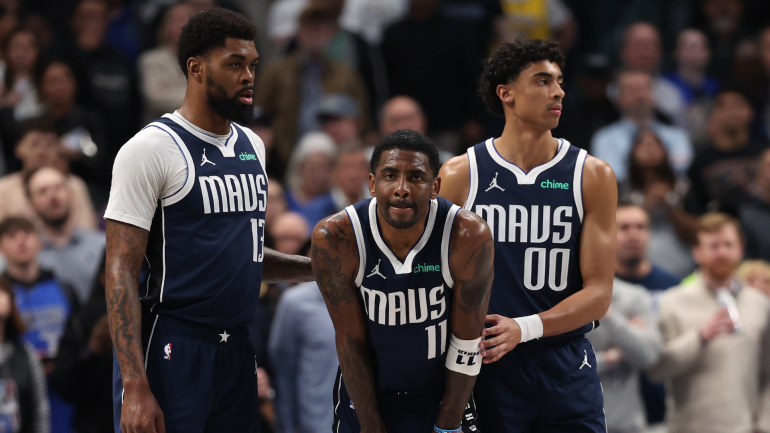
Now that Nico Harrison has been fired, the Dallas Mavericks no longer need to remain committed to the players he acquired. Unsurprisingly, the entire internet raced to publish Anthony Davis trade ideas in the aftermath of Harrison's removal, and a deal makes plenty of sense. The Mavericks will be rebuilt around the 18-year-old Cooper Flagg. A 32-year-old like Davis doesn't fit that timeline. Dallas controls its 2026 first-round pick, but not the next four after that. Tanking this season is therefore vital. Keeping Davis around will win them games they'd prefer to lose.
From that perspective, a Davis trade feels almost inevitable. But he's far from the only movable piece here. The Mavericks did just reach the Finals two seasons ago, after all. There are a lot of players up and down this roster who could help other teams, ideally those with more balanced lineups. Just because someone is struggling this year, on this broken roster, doesn't mean that they can't help a more typical team.
Flagg isn't going anywhere. P.J. Washington legally cannot be traded; he signed an extension in September that created a six-month trade restriction that extends beyond the deadline in February. However, with new co-interim GMs now at the helm in Michael Finley and Matt Riccardi and the possibility of external hires coming down the line, it's fair to assume that anyone else on the roster is theoretically available.
So we're going to propose trade ideas for literally every other player on the team. Each of these trades is being made in isolation (though we'll mention if and when they might connect to other possible trades). Some of these trades won't be legal until Dec. or Jan. 15 because they involve players who signed over the summer, but all are ultimately feasible at some point between now and the deadline.
In the end, it's likely that many of these players wind up staying put. But everyone here is available and, given the hole Harrison dug here, that means anything should be considered. So let's try to figure out if there are viable homes out there for every Maverick, because practically every single one of them is probably gettable under the right circumstances.
Trade 1: Anthony Davis to Golden State
Warriors get: Anthony Davis
Bucks get: Jimmy Butler
Mavericks get: Kyle Kuzma, Bobby Portis, Kevin Porter Jr., Taurean Prince, 2032 first-round pick (via Warriors), 2030 first-round swap rights (via Bucks), 2032 first-round swap rights (via Bucks)
The Warriors have been eyeing Davis for close to a decade now. Giving up Butler would sting and it would create a need to trade for a secondary creator elsewhere, but getting Davis would be worth it. He's a meaningful upgrade on Butler and an absolute perfect fit in Golden State. He'd be Stephen Curry's best teammate since Kevin Durant and give them a vertical dimension offensively that they've never really had.
The problem is matching salary. The cleanest way for Golden State to do this is to trade Butler, but Dallas presumably wouldn't want him if its plan is to rebuild around Flagg. Fortunately, there's a wing-needy win-now team in the East for whom he makes plenty of sense. The Bucks have so much shooting that they can afford to bring in a high-level wing who rarely takes 3s. His ball-handling and defense would more than make up for that vulnerability. The Bucks rank 27th in the NBA in free throw rate this season. Butler addresses that immediately. Send him to Milwaukee and the Bucks are suddenly a genuine Finals contender. Plus, the cost here wouldn't be prohibitive.
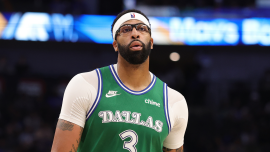
Milwaukee sends out a smattering of role players and, more importantly, two first-round swaps. The first, in 2030, would be the worse of their own pick or Portland's going out. However, it's worth remembering that Dallas owes a 2030 swap to San Antonio, so the pick the Mavericks are sending out will almost certainly be bad. The second swap is Milwaukee's, with no strings attached, in 2032. That's a potentially valuable swap, as Butler will be retired by then and who knows what state Giannis Antetokounmpo will be in, but the Bucks would still keep their 2031 and 2033 first-round picks as trade assets to use in the future. This is an all-in move for the Bucks designed to convince Antetokounmpo to extend this summer.
The cost for Golden State would be steep. Butler revitalized last year's team and, even if Davis is younger and better, they'd feel his absence. It's possible they're sporting an entirely different roster by 2032, so that pick is immensely valuable. The idea here would probably be to refill the draft coffers somewhat by trading Jonathan Kuminga. Perhaps they could go back to Sacramento and figure out the Malik Monk-and-a-first-round-pick deal they couldn't over the summer, but might make more sense now with Butler's absence creating a need for more shot-creation. It might also make sense for Golden State to try to swipe Naji Marshall in this sort of deal too just given their need for a big wing defender if Butler is dealt. A Davis trade alone wouldn't bring Golden State up to Oklahoma City's level, but it would significantly increase their upside and, with one or two more smart plays, a title would be in reach.
Trade 2: Kyrie Irving to Houston
Rockets get: Kyrie Irving
Mavericks get: Fred VanVleet, Dorian Finney-Smith, 2029 first-round pick (second-most favorable of Mavericks, Suns and Rockets)
Irving's trade value is a total mystery. Even when younger and healthy in Brooklyn, interest was tepid. He's a mercurial guy and there are teams that just wouldn't risk bringing him into their building under any circumstances, especially if they knew he didn't want to come there. The torn ACL and three-year contract don't help either. Yet the advantage Dallas has where Irving is concerned is that it doesn't need to trade him. He's been a great organizational soldier since arriving and they can simply hold him out this season while they tank and bring him back presumably at full strength next season.
They're not going to trade Irving just to trade him. They'd have to get something of substance. The number of teams willing to give that to them is going to be small. Irving may not be on a max contract but he's old, expensive and plays the most crowded position in the NBA. We're not doing another round of Lakers rumors. Austin Reaves is too good to justify bringing in another high-level guard whether LeBron James and Luka Dončić are interested in reuniting with their old sidekick or not. Maybe Miami or Milwaukee would be interested, but they're both playing well right now. There's no need for them to rock the boat. Portland is probably the team that would stand to improve the most by getting him, but the regular season matters to the Blazers. They can't take the health risk.
There's really only one team that makes sense and that's Houston, where he could reunite with Kevin Durant. The Rockets are already winning without a starting point guard in VanVleet and Dorian Finney-Smith hasn't debuted yet, so they wouldn't really miss him in a trade like this. They're so loaded with picks that they could afford to give up a lesser one to grease the wheels here. In 2029, Houston gets the two highest picks out of their own, Phoenix's and Dallas'. We'll have them send the second-best of those picks back to the Mavericks to make this deal. If you assume Dallas will be better than Phoenix in 2029, this functionally gives Dallas control over its own pick back at that point beyond lottery luck scenarios.
One possible hiccup here: VanVleet has the right to veto any trades. However, Dallas is arguably a better fit for him in 2027 than Houston at this point. The Rockets are winning with Amen Thompson at point guard and they could credibly argue to VanVleet that Reed Sheppard -- still a mess on defense but playing quite well on offense -- has usurped his place in their long-term plans. If the Rockets are telling him that he'd be returning to a bench role, well, the chance to start in Dallas would hold some appeal.
Irving has a trade bonus, but it's usually easy enough to get a player to waive it when he's going to what he considers a better situation. Case in point: Anthony Davis waived his trade bonus when he came to Dallas last February.
As for Houston? Well, they'd immediately become Oklahoma City's biggest threat to win the championship provided Irving can return in February or March. They might already be there, yet they'd still hold onto their three best draft assets, first-round picks from Phoenix and Brooklyn in 2027 and the best pick out of those three in 2029. Things would get a bit tight financially in 2028, when Durant, Irving, Thompson, Alperen Sengun and Jabari Smith would all be on the books for a lot of money, but there are potential solves there, like Irving opting out and lowering his cap figure in exchange for an extra year of security. Besides, it's only one extremely expensive year and the second apron probably doesn't scare Houston much anyway. They have so many external picks that their own dropping to No. 30 eight or nine years from now isn't especially damaging. Significant improvement now that doesn't cost major future assets is an easy win for the Rockets.
Trade 3: Dallas gets its 2027 pick back
Hornets get: Max Christie, Daniel Gafford
Mavericks get: Collin Sexton, 2027 first-round pick (via Mavericks)
Max Christie and Daniel Gafford are both solid, affordable role players. In the right trade market, they both might net a lower first-round pick at the deadline. So instead of potentially two underwhelming first-round picks... why not combine them to get one very valuable one?
The Hornets have Dallas' 2027 first-round pick from the Grant Williams sign-and-trade a few summers ago. That pick is not especially valuable to Charlotte. Remember, the Mavericks have some measure of control over how good they are. If they don't have that pick, well, they might just shrug and try to make the playoffs in 2027. So, would the Hornets rather have, say, the 17th pick in 2027, or two good, affordable and relatively young role players who fit them quite well? I'm banking on the latter. Gafford's rim gravity would do wonders next to LaMelo Ball and Christie would give them badly needed point of attack defense.
The appeal for Dallas is obvious. The Hornets can't control where their pick ends up, but the Mavs can. If they get the pick back, they can intentionally slow-play their rebuild in the ultra-deep West and aim for another lottery pick. Effectively, the Hornets would be trading away a pick that would probably finish in the middle of the first round, but the Mavericks would be getting one that could potentially land a lot higher. Getting Sexton back for the rest of this year is a nice cherry on top. Dallas needs professional guards if only to run a functioning offense for Cooper Flagg to develop in. Sexton is no All-Star, but he's a solid scorer who will at least take some pressure off of the No. 1 pick.
Trade 4: A swap of promising youngsters
76ers get: Dereck Lively, Brandon Williams
Mavericks get: Jared McCain, Adem Bona
I imagine Lively is close to untouchable. He's dealt with injuries and a lot of what made him special as a rookie was tied to Dončić, but he's still an extremely promising center on a rookie deal. There's no reason he can't be Flagg's long-term frontcourt partner. The only scenario in which it really makes sense to consider a Lively trade would be if, for whatever reason, the Mavericks decided not to trade Davis or Gafford. They shouldn't keep all three and Lively is the one they should prioritize, but if they don't? Well, sure, we can drum up some interest.
The Mavericks, at least at present, have a frontcourt glut. The 76ers have a backcourt glut. So why not help each other out? Jared McCain was on track to win Rookie of the Year last season before he got hurt. By the time he returned, the 76ers had added VJ Edgecombe and Quentin Grimes. He's been a disaster in the few minutes he's played this season, so a trade like this would probably only be feasible down the line, once he's reestablished some value, but the version of McCain we saw last year would roughly be in line with Lively from a trade value perspective. He has an extra cheap year on his rookie deal and would give Dallas the scoring punch its backcourt needs.
As for Philadelphia, the idea of pairing Lively and Joel Embiid as a center rotation in the short-term would actually probably help them both. Neither really should be playing standard starter minutes, but the two could split games relatively comfortably. Ask the 2024 Mavericks how helpful it is to have 48 minutes of starting-caliber center play on a roster. When Embiid's body eventually breaks down further, the hope would be that Lively could slide into the full-time starting role and, with McCain gone, the 76ers could focus on re-signing Grimes next summer and keeping him, Edgecombe and Tyrese Maxey together for the long haul. Brandon Williams and Adem Bona have both been promising young backups, so they'd fill in for the bigger-name players their new teams are giving away at their positions.
Trade 5: Dallas takes on a bad contract with some upside
Pelicans get: Klay Thompson, Caleb Martin, Dwight Powell
Mavericks get: Dejounte Murray
One of the benefits of rebuilding around an 18-year-old is that it affords you plenty of room to take on bad contracts. The Mavericks have three cheap years for Flagg left after this season ends and their 2026 first-round pick has four cheap years ahead of him. As those players will likely be the core of the next competitive Mavericks team, they can afford to pay other players where it makes sense.
The Pelicans have little reason to keep Dejounte Murray. He struggled mightily in his first half-season in New Orleans, he tore his Achilles, and he shared some very troubling criticism of the organization last offseason. They just drafted Jeremiah Fears as their point guard of the future. Murray is just taking up $30 million or so on their books for this season and the next two afterward, so they'd likely be eager to split his bad contract into two smaller ones, much like the Mavericks did a few years ago when they swapped Kristaps Porziņģis for Davis Bertans and Spencer Dinwiddie. You never want bad money, but you'd rather have a few, small bad contracts than one big one because they're inevitably easier to move in subsequent deals.
As for the Mavericks? Having that bad contract on their books wouldn't bother them much. By the time they'll get serious about winning, he'll either be an expiring contract they can trade or just already gone. He expires in time for the summer of 2028, giving Dallas a potential cap space summer before Flagg's rookie extension kicks in. They'd just be taking a free look at a former All-Star. If he's bad? No harm done. The Mavericks could even hold him out all season to ensure he comes back healthy next year and help protect their tank by clearing out a number of roster spots that could then go to younger, developmental signings. But if he's good? Congratulations, you've added a player who the Pelicans just paid two first-round picks and Dyson Daniels for two summers ago effectively for free. Minimal risk, potentially high reward.
For the moment, this trade technically isn't legal. The Mavericks are above the first apron, so they can't take in more money than they send out in a trade. The gap here is only $600,000 or so, though, so that's a solvable problem, likely by looping this deal into a bigger one or by just getting below the first apron in a separate Davis deal.
Trade 6: Dallas gets a high-upside swap
Nuggets get: Naji Marshall
Mavericks get: Zeke Nnaji, 2031 first-round swap (via Nuggets)
Here's another example of how bad contracts mean more to some teams than others. The Zeke Nnaji contract isn't huge, but it's long, and having $8 million on the books from a player who doesn't play is a nightmare for a team as expensive as the Nuggets. For the Mavericks, though, it just wouldn't be that harmful.
So this is a relatively straightforward trade. The Nuggets turn a player they aren't using into a solid wing defender who gives them a bit of forward insurance in case Cam Johnson's shot doesn't come around. The Mavericks get a potentially very valuable first-round swap from the Nuggets deep in the future, when Nikola Jokić may be retired or diminished. Expect plenty of interest in Marshall from contenders. Cheap wings who can defend and survive on offense are worth their weight in gold.
Trade 7: Finishing up the exercise
Kings get: D'Angelo Russell, Jaden Hardy
Mavericks get: Dennis Schröder
We're down to our last two Mavericks here and, admittedly, there just isn't going to be much interest. Jaden Hardy has plateaued after a promising start to his career and we seemingly relearn every offseason that the league just isn't that interested in D'Angelo Russell. Realistically, we're probably looking at a trade for someone else's problem.
Would Dallas want to take on the three-year Dennis Schröder contract? Probably not. Rarely do you want to be the ninth team to employ a player in a five-year span, and Schröder is off to a very poor start in Sacramento. But he was just great in Detroit and has tended to succeed on teams that give him the ball. He's still a useful defender despite his size, so Dallas could potentially bring him in and pump his value back up before eventually moving him when some more time has ticked off of his contract. He's the best player in this trade; he just has the worst contract.
As for the Kings? They'd be getting out of a bad contract they themselves just handed out. In their defense, they may not have known that Schröder would get outplayed by Russell Westbrook early in the season, and Russell is both an easier fit with Westbrook (and DeMar DeRozan) because of his shooting and a superior pick-and-roll playmaker. If you ignore defense (and their whole roster-construction suggests that they have), he's the better fit on their roster. This trade would have to come in conjunction with another move, because Dallas doesn't have enough hard-cap space to make it right now and the same first-apron restrictions from the New Orleans trade also apply, but those are solvable problems. They won't trade everyone on the roster as we just have, but it's hard to imagine they stop at a Russell-and-Hardy trade.


